

DECEMBER • VOL. 12 • SERIES OF 2022
INSIGHTS is a monthly publication of BDB LAW to inform, update and provide perspectives to our clients and readers on significant tax-related court decisions and regulatory issuances (includes BIR, SEC, BSP, and various government agencies).
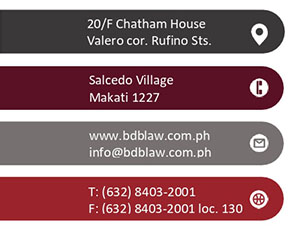
DISCLAIMER: The contents of this Insights are summaries of selected issuances from various government agencies, Court decisions, and articles written by our experts. They are intended for guidance only and as such should not be regarded as a substitute for professional advice.
Copyright © 2022 by Du-Baladad and Associates (BDB Law). All rights reserved. No part of this issue covered by this copyright may be produced and/or used in any form or by any means – graphic, electronic, and mechanical without the written permission of the publisher.
What's Inside ...
- HIGHLIGHTS FOR NOVEMBER 2022
- SIGNIFICANT COURT DECISIONS
- Court of Tax Appeals
- SIGNIFICANT REGULATORY ISSUANCES
- Bureau of Internal Revenue
- Bangko Sentral Ng Pilipinas
- Insurance Commission
- Fiscal Incentives Review Board
- PUBLISHED ARTICLE
- Struggles under the Withholding Tax System
- OUR EXPERTS
- The Personalities
- The Personalities


HIGHLIGHTS for NOVEMBER 2022
COURT DECISIONS
- An annual audit program is not a condition precedent for the issuance of an LOA. (St. Timothy Construction Corporation, et. al. vs. BIR, CTA Case No. 10472, November 3, 2022)
- Absent any proof that the final notice and demand for payment was received by the taxpayer, it cannot be said that an offense has been committed because prior to the receipt of the assessment notice, no violation has yet been committed. (People of the Philippines vs. Cesar Vacunawa Lebite, CTA Crim Case. O-914, November 7, 2022)
- In the absence of law or ordinance, municipal treasurers are without authority to initiate suit against a claim of RPT refund. (Imelda Macanes, in her capacity as the Provincial Treasurer of Benguet and Merlita G. Tolito, in her capacity as OIC of the Municipal Treasury Office of Bakun Benguet v. Luzon Hydro Corporation, CTA EB No. 2407 (CBAA Case No. L-141-2018), November 7, 2022)
- VFP is a government instrumentality exempt from payment of RPT. (City of Taguig v. Veterans Federation of the Philippines, CTA EB No. 2522, November 4, 2022)
- In assessment proceedings, if TPI discrepancies occur, the taxpayer is required to submit schedules and reconciliations, while the BIR is required to obtain sworn statements from TPI sources. (BASF Philippines, Inc. v. The Commissioner of Internal Revenue, CTA Case No. 10221, November 3, 2022)
- A review of Section 196 of the LGC of 1991 reveals that it does not require that the nature of tax or fee levied to be specified. (Holcim Philippines, Inc. v. The City of Manila and Josephine D. Daza, in her capacity as the City Treasurer of the City of Manila, CTA AC No. 251, 18 November 2022)
- If no assessment notice is issued by the local treasurer, and the taxpayer claims that it erroneously paid a tax, fee, or charge, or that the tax, fee, or charge has been illegally collected from him, then Section 196 of the LGC applies. (Casas+ Architects vs. The City of Makati and Jesusa E. Cuneta, in her capacity as the City Treasurer of the City of Makati, CTA AC Case No. 259, 24 November 2022)
BIR ISSUANCES
- RR No. 14-2022, November 11, 2022 – This implements the provisions of RA No. 1190, relative to the importation, manufacture, sale, packaging, distribution, use, and communication of vaporized nicotine, products, and novel tobacco products.
- RMC No. 143-2022, November 8, 2022 – This clarifies issues relative to RR No. 13-2022 on income tax treatment of equity-based compensation.
- RMC No. 148-2022, November 12, 2022 – This circularizes the lifting of the suspension on all filed operations and other field operations of the BIR.
BSP ISSUANCES
- BSP Circular No. 1159, Series of 2022 Dated November 04, 2022 – Implementing Rules and Regulations of the Mandatory Agriculture, Fisheries and Rural Development Financing under Republic Act (R.A.) No. 11901 or “The Agriculture, Fisheries and Rural Development Financing Enhancement Act of 2022”
- BSP Circular No. 1160, Series of 2022 Dated November 28, 2022 – Regulations on Financial Consumer Protection to Implement Republic Act No. 11765, otherwise known as the "Financial Products and Services Consumer Protection Act"
- BSP Circular Letter No. CL-2022-077 Dated November 14, 2022 – Bank of Commerce – Upgrade of the License to Operate from a Commercial Bank into a Universal Bank
- BSP Circular Letter No. CL-2022-078 Dated November 16, 2022 – Anti-Money Laundering Council (AMLC) Regulatory Issuance No. 4, Series of 2022 — Rules and Regulations Implementing (RRI) Section 9 (d) of Republic Act (RA) No. 9208, as Amended by RA No. 11862, Otherwise Known as the Expanded Anti-Trafficking in Persons Act of 2022 (ATIP)
- Memorandum M-2022-048 Dated November 14, 2022 – Guidelines on the Submission of the Report on Assets of Non-Resident Participants in Unit Investment Trust Funds
IC ISSUANCES
- Circular Letter No. 2022-49 dated November 21, 2022 - This provides for the Revised Implementation Requirements for the Valuation Standards For Health Maintenance Organization (HMO) Agreement Liabilities And Annual Reporting For HMOs.
- Circular Letter No. 2022-50 dated November 22, 2022 - This provides for the Amendment to Circular Letter No. 2021-72.
- Circular Letter No. 2022-51 dated November 28, 2022 - This provides for the Insurance Commission Advance Release Calendar and Revision Policy of Statistical Reports.
FIRB ISSUANCES
- FIRB Advisory No. 010-2022 dated November 23, 2022 – This provides for the Deadline for Submission of the Annual Tax Incentives Report (AITR) and Annual Benefits Report (ABR) for the Taxable Year 2022

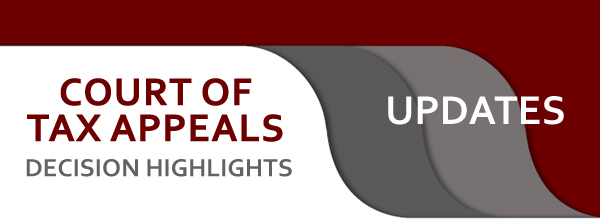
An annual audit program is not a condition precedent for the issuance of an LOA.
The taxpayers sought for the cancellation of the LOAs issued to them by the BIR on the ground that the LOAs failed to expressly state the basis for the audit and the audit program as required by RMO No. 44-2010 and RAO No. 3-2014.
The Court held that an annual audit program is not a condition precedent for the issuance of an LOA. An LOA can still be issued despite the absence of an annual audit program as clarified under RMC No. 006-13.
The audit program being "mandated" by the taxpayers, could not be stated in the LOA for the reason of practicality as it contains the prescribed policies, guidelines, and procedures to be observed in the audit/investigation of tax returns. Besides, the purpose of an LOA is to give notice to the taxpayer that it is under investigation for possible deficiency tax assessment; at the same time, it represents the authority given to the named/designated Revenue Officer to perform assessment functions. (St. Timothy Construction Corporation, et. al. vs. BIR, CTA Case No. 10472, November 3, 2022)
Absent any proof that the final notice and demand for payment was received by the taxpayer, it cannot be said that an offense has been committed because prior to the receipt of the assessment notice, no violation has yet been committed.
Absent any proof that the final notice and demand for payment was received by the taxpayer, it cannot be said that an offense has been committed because prior to the receipt of the assessment notice, no violation has yet been committed.
In the instant case, the prosecution claimed that the FAN and FLD were sent to Cesar Vacunawa Lebite through registered mail on October 24, 2012. However, the records of the case will show that there was no evidence that the FAN and FLD both dated October 24, 2012 were received by the Cesar Vacunawa Lebite. (People of the Philippines vs. Cesar Vacunawa Lebite, CTA Crim Case. O-914, November 7, 2022)
In the absence of law or ordinance, municipal treasurers are without authority to initiate suit against a claim of RPT refund.
The CBAA granted the taxpayer’s claim for RPT refund and order the municipal treasurer of Bakun, Benguet to recompute the taxpayer’s RPT in accordance with EO No. 88 s. 2019. The municipal treasurer assailed the order of the CBAA and appealed the same before the Court by way of a Petition for Review. The taxpayer argued that the municipal treasurer has no authority to file the petition.
The Court dismissed the petition. It held that although Section 183 and 266 of the LGC authorize the local treasurer to collect delinquent taxes, fees, charges or other revenues and RPT through judicial action, said provisions show that such authority applies specifically to a collection case. The instant petition does not involve collecting delinquent taxes but a case emanated from taxpayer’s claim for refund or credit of the subject RPT before the LBAA. The LGC provides that only the provincial governor has the authority to file suits on behalf of the province. However, the municipal treasurer did not present any ordinance, resolution or any other written proof of their authority to file. (Imelda Macanes, in her capacity as the Provincial Treasurer of Benguet and Merlita G. Tolito, in her capacity as OIC of the Municipal Treasury Office of Bakun Benguet v. Luzon Hydro Corporation, CTA EB No. 2407 (CBAA Case No. L-141-2018), November 7, 2022)
VFP is a government instrumentality exempt from payment of RPT.
Veterans Federation of the Philippines (VFP) contends that it is exempt from payment of RPT for being a government instrumentality.
The Court ruled that VFP is a government instrumentality. It held that VFP failed to satisfy the hallmarks of a GOCC, i.e. VFP is neither a stock or non-stock, and neither performs economic or commercial activities. Hence, the Court is certain that taxpayer is a government instrumentality. Therefore, it is exempt from paying RPT. The Court emphasized that even if VFP is not or ceases to be a government instrumentality, it is still exempt from payment of RPT as expressly provided under Section 11 of RA No. 2640. Further, the tax-exempt status was reiterated and confirmed by RA No. 7291. Consequently, the warrant of levy issued against VFP is null and void. (City of Taguig v. Veterans Federation of the Philippines, CTA EB No. 2522, November 4, 2022)
In assessment proceedings, if TPI discrepancies occur, the taxpayer is required to submit schedules and reconciliations, while the BIR is required to obtain sworn statements from TPI sources.
Taxpayer claims that the subject deficiency tax assessments based on third-party information (TPI) are void for being based on mere presumptions and unverified data. Thus, failure to validate such TPI (on which the alleged discrepancies were based) rendered the assessment void for lack of factual basis.
CIR, on the other hand, argues that taxpayer cannot assail the TPI's correctness since the certifications obtained from the latter are for the internal records of respondent only. The discrepancies, if any, are shared to taxpayers only through the PAN and FAN, with schedules for reconciliation. CIR further argues that he or she validated the information used in the assessment in accordance with Revenue Memorandum Order (RMO) Nos. 04-2003 and 46-2004.
The Court declared as null and void the deficiency VAT pertaining to undeclared sales due to TPI. Based on the provisions of RMO No. 04-2003 and RMO No. 46-2004, in assessment proceedings, if TPI discrepancies occur, the taxpayer is required to submit schedules and reconciliations to substantiate its claims. In addition, the taxpayer is required to execute a sworn statement to attest the veracity and authenticity of the schedules and documents presented/submitted. On the other hand, BIR is required to obtain sworn statements from TPI sources to attest the veracity of the data provided. To obtain sworn statements, BIR must first send confirmation requests to the third-party sources, or coordinate with the RDO, who has jurisdiction over the third-party sources, to course through the confirmation requests to the letter. In this case, although there are confirmation letters attached to the BIR records, CIR did not offer them as evidence. Further, no registered return cards can be found although the addressees of the confirmation letters are located outside of the jurisdiction of the investigation office. Based on the foregoing, the Court can only conclude that respondent failed to comply with his or her own regulations, thus resulting in an assessment arising from or based on unverified information. (BASF Philippines, Inc. v. The Commissioner of Internal Revenue, CTA Case No. 10221, November 3, 2022)
A review of Section 196 of the LGC of 1991 reveals that it does not require that the nature of tax or fee levied to be specified.
Taxpayer claims that its right to due process was violated when the City Treasurer of Manila failed to specify the nature of tax, fee or charge being collected in the Statement of Accounts (SOAs).
A review of Section 196 of the LGC of 1991 reveals that it does not require that the nature of tax or fee levied to be specified. In stark contrast thereto, Section 195 of the LGC of 1991 provides such degree of specificity as regards the issuance of a notice of assessment (NOA).
The SOA issued in connection with the renewal of the taxpayer’s business permit are distinct from a NOA issued in connection with Section 196 of the LGC of 1991. Noteworthy is the fact that the purpose of requiring tax authorities to properly inform the taxpayer of both the legal and factual bases, including the nature of the tax, fee or charge, of the assessment is to aid the taxpayer to make an effective and reasonable protest.
The rationale behind the requirement conforms with the constitutional mandate that no person shall be deprived of his or her property without due process of law. Such is not the case in actions falling under Section 196 of the LGC of 1991 where no assessment is involved. (Holcim Philippines, Inc. v. The City of Manila and Josephine D. Daza, in her capacity as the City Treasurer of the City of Manila, CTA AC No. 251, 18 November 2022)
If no assessment notice is issued by the local treasurer, and the taxpayer claims that it erroneously paid a tax, fee, or charge, or that the tax, fee, or charge has been illegally collected from him, then Section 196 of the LGC applies
The RTC of Makati City ruled that the taxpayer is not entitled to its claim for refund for local business taxes for failure to comply with the procedures under Section 195 of the LGC. On appeal, taxpayer contends that the billing assessments issued by the Business Tax Division of Makati City were in relation to its application for renewal of its business permits; that they were not issued or made after an examination of the books and records of petitioner and a finding by the local treasurer that incorrect taxes were paid; that petitioner did not receive any letter of authority or notification letter for the conduct of an audit of its books; and that it did not receive prior notice of assessment from the City Treasurer.
The Court ruled that the RTC erroneously applied Section 195, instead of Section 196 of the LGC. If the taxpayer receives an assessment and does not pay the tax, its remedy is strictly confined to Section 195 of the LGC. On the other hand, if no assessment notice is issued by the local treasurer, and the taxpayer claims that it erroneously paid a tax, fee, or charge, or that the tax, fee, or charge has been illegally collected from him, then Section 196 applies.
The billing statements/assessments in this case do not constitute “assessments” within the ambit of Section 195 of the LGC. Hence, Section 196 of the LGC governs taxpayer's claim for refund. (Casas+ Architects vs. The City of Makati and Jesusa E. Cuneta, in her capacity as the City Treasurer of the City of Makati, CTA AC Case No. 259, 24 November 2022)

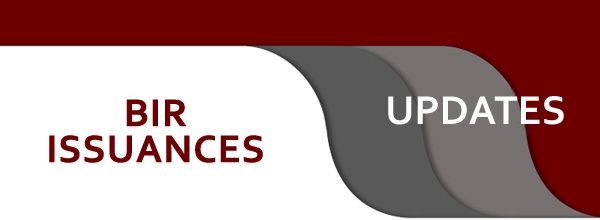
RR No. 14-2022,
November 11, 2022
This implements the provisions of RA No. 1190, relative to the importation, manufacture, sale, packaging, distribution, use, and communication of vaporized nicotine products, and novel tobacco products.
This implements the provisions of RA No. 1190, relative to the importation, manufacture, sale, packaging, distribution, use, and communication of vaporized nicotine products, and novel tobacco products.
This regulation prescribes guidelines on the following:
1. Tax rates and bases of excise taxes
2. Compliance and administrative requirements for the manufacturers or importers
3. Online trade
4. Floor price or minimum price of vaporized nicotine and non-nicotine products and novel tobacco products which shall be the total production cost/expense/landed cost of the cheapest brand per tobacco product including the sum of excise tax and VAT.
5. Usage of local tobacco products
6. Penalties for non-compliance
RMC No. 143-2022,
November 8, 2022
This clarifies issues relative to RR No. 13-2022 on income tax treatment of equity-based compensation.
This provides further clarification and guidelines to issues relative to RR No. 13-2022 on income tax treatment of equity-based compensation.
1. Effectivity
• Shall be effective on October 29, 2022 and shall be applied prospectively.
• Any exercise or availment by employee-grantee (whether rank-and-file or occupying managerial or supervisory position) of the granted equity-based compensation on or before October 29, 2022 shall be considered as compensation subject to withholding tax on compensation.
2. Tax Treatment
| Grant of Equity-Based Compensation | No CGT and DST shall be imposed. |
| Sale or Transfer of Equity-Based Compensation |
Treated as sale, barter, or exchange of stocks not listed on the stock exchange. • With consideration – subject to CGT under Section 24 (C) of the 1997 NIRC. |
| Exercise of Equity-Based Compensation |
Subject to the following taxes, as applicable: • Income Tax |
3. Filing of the required tax returns
RMC No. 148-2022,
November 12, 2022
This circularizes the lifting of the suspension on all filed operations and other field operations of the BIR.
This circularizes the lifting of the suspension on all filed operations and other field operations of the BIR pursuant to RMC 77-2022.
All field audit, field operations, or any form of business visitation in execution of Letters of Authority/Audit Notices (LOAs) or Mission Orders (MOs) can be already conducted, and new LOAs/MOs can be further issued.

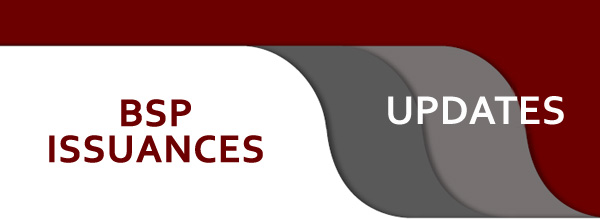
BSP Circular No. 1159, Series of 2022 Dated November 04, 2022
Implementing Rules and Regulations of the Mandatory Agriculture, Fisheries and Rural Development Financing under Republic Act (R.A.) No. 11901 or “The Agriculture, Fisheries and Rural Development Financing Enhancement Act of 2022”.
The Monetary Board, in its Resolution No. 1542 dated 21 October 2022, approved the rules and regulations governing the mandatory agriculture, fisheries and rural development financing under Republic Act (R.A.) No. 11901, otherwise known as "The Agriculture, Fisheries and Rural Development Financing Enhancement Act of 2022".
BSP Circular No. 1160, Series of 2022 Dated November 28, 2022
Regulations on Financial Consumer Protection to lmplement Republic Act No. 11765, otherwise known as the "Financial Products and Services Consumer Protection Act"
The Monetary Board, in its Resolution No. 1683 dated 17 November2022, approved the adoption of the Amended Regulations and Guidelines on Financial Consumer Protection (FCP) Framework to implement Republic Act No. 11765 or the Financial Products and Services Consumer Protection Act (FCPA), and accordingly approved the amendments of the relevant provisions of the Manual of Regulations for Banks (MORB) and Manual of Regulations for Non-Bank Financial Institutions (MORN BFI).
BSP Circular Letter No. CL-2022-077 Dated November 14, 2022
Bank of Commerce - Upgrade of the License to Operate from a Commercial Bank into a Universal Bank
The Monetary Board, in its Resolution No. 1798 dated 23 December 2021, approved the application of Bank of Commerce (BOC) to upgrade its banking license from a commercial bank to a universal bank under the same corporate name.
The Securities and Exchange Commission approved on 9 August 2022 the amended Articles of Incorporation bearing the universal banking license. The corresponding Certificate of Authority to Operate as a universal bank was signed by the Bangko Sentral Governor on 4 October 2022.
BOC commenced its operations as a universal bank on 2 November 2022.
BSP Circular Letter No. CL-2022-078 Dated November 16, 2022
(AMLC) Regulatory Issuance No. 4, Series of 2022 - Rules and Regulations Implementing (RRI) Section 9(d) of (RA) No. 9208, as amended by RA No. 11862, otherwise known as the Expanded Anti-Trafficking in Persons Act of 2022 (ATIP).
This is to disseminate the AMLC Rules and Regulations Implementing (RRI) Section 9 (d) of the Expanded ATIP of 2022 1 which took effect on 28 October 2022.
The RRI focuses on two major items, namely the (1) reporting of suspicious activities and transactions, and (2) bank inquiry and access to non-bank financial records. As to the reportorial requirements section, it covers (a) reporting of suspicious activities to law enforcement agencies, (b) reporting of suspicious transaction reports to the AMLC, and (c) suspicious circumstances and red flag indicators. On the other hand, the access to financial records covers bank inquiry and financial records not covered by the bank deposit secrecy laws.
Memorandum M-2022-048 Dated November 14, 2022
Guidelines on the Submission of the Report on Assets of Non-Resident Participants in Unit Investment Trust Funds
Relative to the amendment to the Manual of Regulations for Banks and the Manual of Regulations for Non-Bank Financial Institutions under Circular No. 1157 dated 14 October 2022 allowing trust entities (TEs) to participate in the secondary market for BSP Securities through unit investment trust funds (UITFs) with minimal non-resident participation, a reporting requirement is introduced for all TEs that offer UITFs. This is the Report on Assets of Non-Resident Participants in UITFs (RANRP).
The report shall consist of the prescribed data entry template (DET) and its corresponding Control Prooflist (CP).
Report submissions that do not conform with the prescribed guidelines shallnot be accepted. Beginning with the reference month of December 2022, applicable penalties will be imposed for erroneous, delayed or unsubmitted reports
.

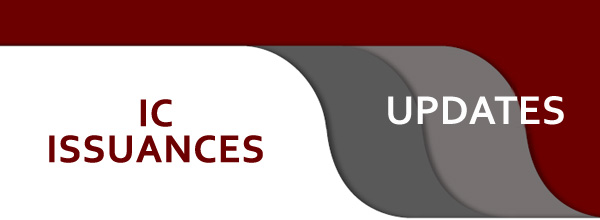
Circular Letter No. 2022-49 dated November 21, 2022
This provides for the Revised Implementation Requirements for the Valuation Standards For Health Maintenance Organization (HMO) Agreement Liabilities And Annual Reporting For HMOs.
• Membership Fee Reserve
For 2020 and 2021, companies shall be allowed to set up as Membership Fee Reserves the Unearned Membership Fee Reserves (UMFR) instead of the higher of the UMFR and Unexpired Risk Reserve (URR). The UMFR may be calculated using the 1/24th method. Starting 2022, the Membership Fee Reserves shall be determined in accordance with the valuation standards prescribed under CL No. 2020-22.
• Margin for Adverse Deviation
Companies shall be allowed to set the Margin for Adverse Deviation (MfAD) as follows:
| Period Covered |
Percentage of company-specific MfAD |
| 2021 - 2022 | 0% |
| 2023 - 2024 | 50% |
| 2025 - 2026 | 75% |
| 2027 onwards | 100% |
• Reserves under an ASO Endorsement
For 2020, and 2021, companies shall be allowed to compute the Unearned Administrative Fee Reserves (UAFR) using the 1/24th method.
Starting 2022, the UAFR shall be calculated in accordance with Section 10.2 of the valuation standards.
• Reportorial Requirements
The Annual Reportorial Requirements prescribed in Section 2.1 of CL No. 2016-41 shall include the Actuarial Valuation Report in accordance with CL No. 2020-22 and shall be submitted on or before 31st of May of the succeeding year of the reporting year starting 31 December 2020.
Circular Letter No. 2022-50 dated November 22, 2022
This provides for the Amendment to Circular Letter No. 2021-72.
Section 1 of Circular Letter No. 2021-71 is hereby amended to read as follows:
"Section 1. DEPOSIT OF SECURITIES
Every insurance company that is compliant with the existing minimum paid-up capital, Net Worth and Risk-Based Capital requirements, and are currently not compliant in amount and in form of the required Security Deposit, shall be allowed to invest in government securities monthly for a period of until December 22, 2022. with no further extension. Concerned companies shall submit proof of compliance with the required Security Deposit to this Commission. through the lnvestment Services Division, not later than December 22. 2022. ln relation thereto, the company shall submit a sworn undertaking which shall be duly signed by the company's President and Chairman supported with a board resolution clearly stating the action taken and authorizing the said signatories."
Circular Letter No. 2022-51 dated November 28, 2022
This provides for the Insurance Commission Advance Release Calendar and Revision Policy of Statistical Reports.
The Advance Release Calendar (ARC) shall serve as basis for the release of statistical reports of the Commission:
1. The ARC provides the public of the release dates of the statistical outputs of the Commission.
2. The release of statistical outputs of the Commission shall coincide with the request of stakeholders (e.g. National Government Agencies) that use the indicators as part of their input to estimation of national indicators, or compilation of important indicators that prescribes current status of the insurance, pre-need and HMO industries.
3. The Commission shall monitor the timeliness of the release of reports.
Should the statistical reports convey preliminary data or need revisions for any reason, the revision policy is as follows:
1. The quarterly reports produced by the Commission shall be revised as needed and posted on the lC website following the schedule of release of the next quarter report.
2. The annual reports produced by the Commission shall be revised as needed in the succeeding report.
3. Revisions and the corresponding notes relative to the changes shall be posted on the lC website. The revised reports shall replace the old reports except for the lC Annual Report where an erratum or its equivalent shall instead be posted.

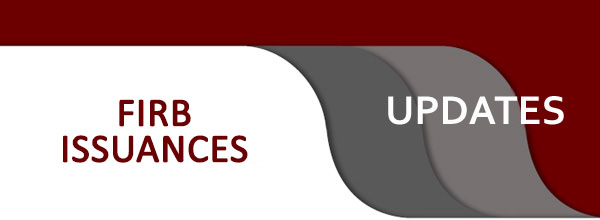
FIRB Advisory No. 010-2022 dated November 23, 2022
This provides for the Deadline for Submission of the Annual Tax Incentives Report (AITR) and Annual Benefits Report (ABR) for the Taxable Year 2022.
The following final deadlines shall be observed by RBEs and OREs for all annexes of ATIR and ABR, without prejudice to the Investment Promotion Agencies (IPAs) and Other Government Agencies (OGAs) imposing stricter deadlines per annex in order to validate submissions
| Period Covered |
Percentage of company-specific MfAD |
Deadline of ATIR ABR |
| Calendar Year | December 31, 2022 | May 17, 2023 |
| Fiscal Year | January 1, 2022 - December 30, 2022 |
Following the deadline for RBEs and OREs for all annexes of ATIR and ABR, the IPAs and the OGAs shall submit the consolidated ATIR and ABR per IPA to the FIRB and Bureau of Internal Revenue (BIR) on June 16, 2023.

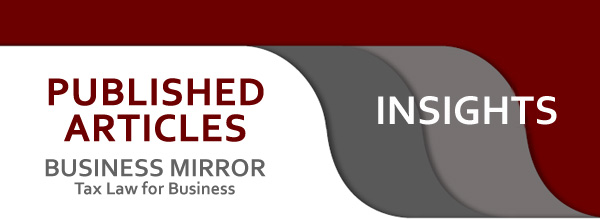
Struggles under the Withholding Tax System
By Atty. Mabel L. Buted
The withholding tax system of collecting taxes by the Bureau of Internal Revenue (Bureau) has been in place for a long time. Under the said system, the taxes due from the income earners are collected in advance at source – from the payors of the income who are constituted as the withholding tax agents. The withholding tax agents withhold at special rates and remit the taxes withheld to the government on a monthly basis or as often as required by the applicable rules. Except for the final withholding taxes, the taxes withheld shall be credited against the taxes due on the related income at the end of a quarter or year when the income earner is required to file his tax returns.
While the system reduces the collection efforts of the government, the current withholding tax rules present some struggles on the recipients of income.
The first one relates to the claiming of tax credit. The present rules allow the income earners to claim the tax withheld as tax credit so long as there is proof that the tax was withheld by presenting the withholding tax certificate or BIR Form No. 2307 provided by the payor. The payor provides the said certificate when it withholds the tax – that is, when an expense or asset is accrued or recorded, or when the same is paid, whichever comes first. So, here is a situation where the tax withheld may already be utilized as tax credit even if the corresponding income has not been earned. And the current rules allow this. However, during tax investigations, the examiners would usually treat the income payment upon which the tax was withheld as already earned and assess the corresponding income tax due. The taxpayer is then faced with the dilemma of claiming the tax credit but with the possible risk of paying additional tax on the income allegedly already earned.
Another problem relates to the excess taxes withheld. Under the current rules, almost all types of income are subject to withholding taxes, and the bases are the gross amounts. Because of these factors, plus that fact that the withholding tax rates are high, oftentimes, the taxes collected and withheld on income are more than the final income tax due at year-end, resulting in excess tax credits. And the only available remedies to utilize or recover these excess taxes are – to carry over or to claim for a refund or tax credit certificate. Notwithstanding that these have already been paid in advance, the Bureau would, during tax audits, not consider these as tax credits against the resulting deficiency taxes due unless tax credit certificates are presented.
Taxpayers would normally opt for the carry-over, with the hope that they can use the excess amount as payment of the income taxes in the succeeding periods. This is so because refund process involves difficult and tedious task.
With the present practices, however, taxpayers are struggling to have their excess taxes paid recovered in the form of refund. The Bureau seldom acts on refund claims and even if acted upon, disallowances cannot be avoided. That’s the reason why a number of refund claims are elevated to the Courts. If the BIR ever acts upon a claim, this will undergo the audit process. In undertaking such audit, some documents are requested which are not presently warranted – like proof of remittance of withholding tax and the alphalist of income payors – and unless these documents are provided, the claim is denied.
Further, based on a recent pronouncement by the Court (G.R. Nos. 242647 & 243814, March 15, 2022), in the refund of excess withholding taxes, the taxpayer needs to prove not only the taxes withheld in the current period, but also the prior year’s excess tax credits. If the prior year’s excess tax credits are applied against the income tax due for the period of claim, these prior year’s excess tax credits must be supported as well with withholding tax certificates. Otherwise, the income tax due will be paid by the creditable taxes withheld for the current period, thus reducing or eliminating the refundable amount.
The withholding tax system is just a method in the collection of taxes. Even in this system, taxpayers should be paying only the taxes that are properly due from them. So, rules and processes should not be difficult for the recovery of unused advance tax payments.
----------------------------------------------
For inquiries on the article, you may call or email
ATTY. MABEL L. BUTED
Junior Partner
T: +63 2 8403 2001 loc. 160
This email address is being protected from spambots. You need JavaScript enabled to view it.


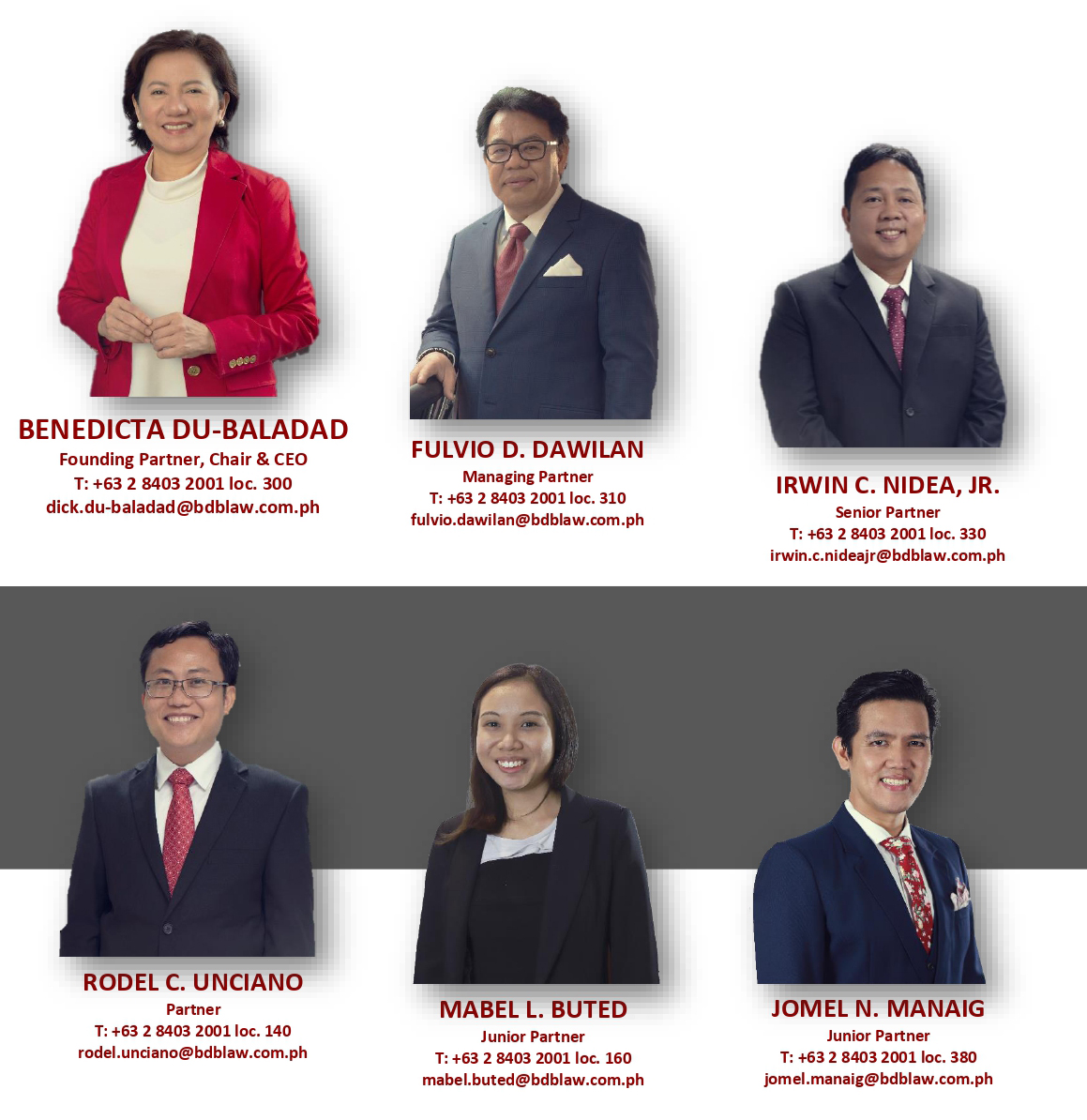
DISCLAIMER: The contents of this Insights are summaries of selected issuances from various government agencies, Court decisions and articles written by our experts. They are intended for guidance only and as such should not be regarded as a substitute for professional advice.
Copyright © 2022 by Du-Baladad and Associates (BDB Law). All rights reserved. No part of this issue covered by this copyright may be produced and/or used in any form or by any means – graphic, electronic and mechanical without the written permission of the publisher.





